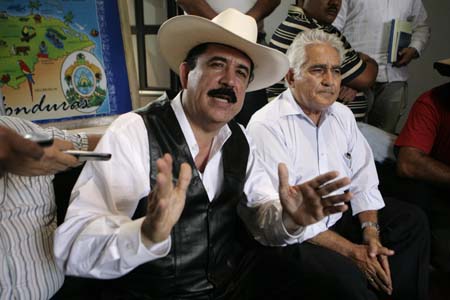Ousted Honduran President Manuel Zelaya on Thursday began his trip home amid fears his return could start a wave of violence in the already impoverished Central American country.
 |
|
Honduras' ousted President Manuel Zelaya arrives at the Honduras embassy in Managua July 23, 2009. Zelaya on Thursday began his trip home amid fears his return could start a wave of violence in the already impoverished Central American country. [Xinhua]
|
Zelaya, who was deposed in a military coup on June 28, announced his plan to return to Honduras hours after the talks between his delegation and the post-coup government, mediated by Costa Rican President Oscar Arias, failed Wednesday.
He departed from Managua, capital of Nicaragua, at about 4:15 p.m. local time (2215 GMT) to Nicaraguan municipalities bordering Honduras. The ousted president is expected to enter Honduras at a time between Friday and Sunday.
A caravan formed by local and international press accompanied Zelaya, whose supporters will meet him at the border.
Despite the alleged detention order against him and the threat of being shot once he enters Honduran territory, Zelaya said he was not afraid.
"I know that there are threats of shooting me. I have been told not to enter Honduras, because they (coup-leaders) are ready to do it," he told an Argentine TV channel.
Zelaya said he has "all the right to retake the charge that the Honduran people gave him in the elections."
Tensions in Honduras
In Honduras, Zelaya's followers began a nationwide strike that was joined by workers from the Education Ministry, the National Company of Energy, the National Agrarian Institute and the Institute of Social Security.
His supporters also blocked the northeast, north, west, Atlantic and east entrance to the country.
Meanwhile, Honduran entrepreneurs offered financial aid to the country's de facto government, led by Roberto Micheletti, to equip the police and buy weapons due to the possibility of Zelaya's supporters taking up weapons.